Analysis of a Company Director's Duty to Avoid Conflicts
VerifiedAdded on 2023/01/17
|12
|1024
|46
Report
AI Summary
This report delves into the critical duty of a company director to avoid conflicts of interest, as outlined in Section 175 of the Companies Act 2006. The analysis explores various scenarios that can lead to conflicts, such as exploiting company property, pursuing personal profits, and engaging with connecte...
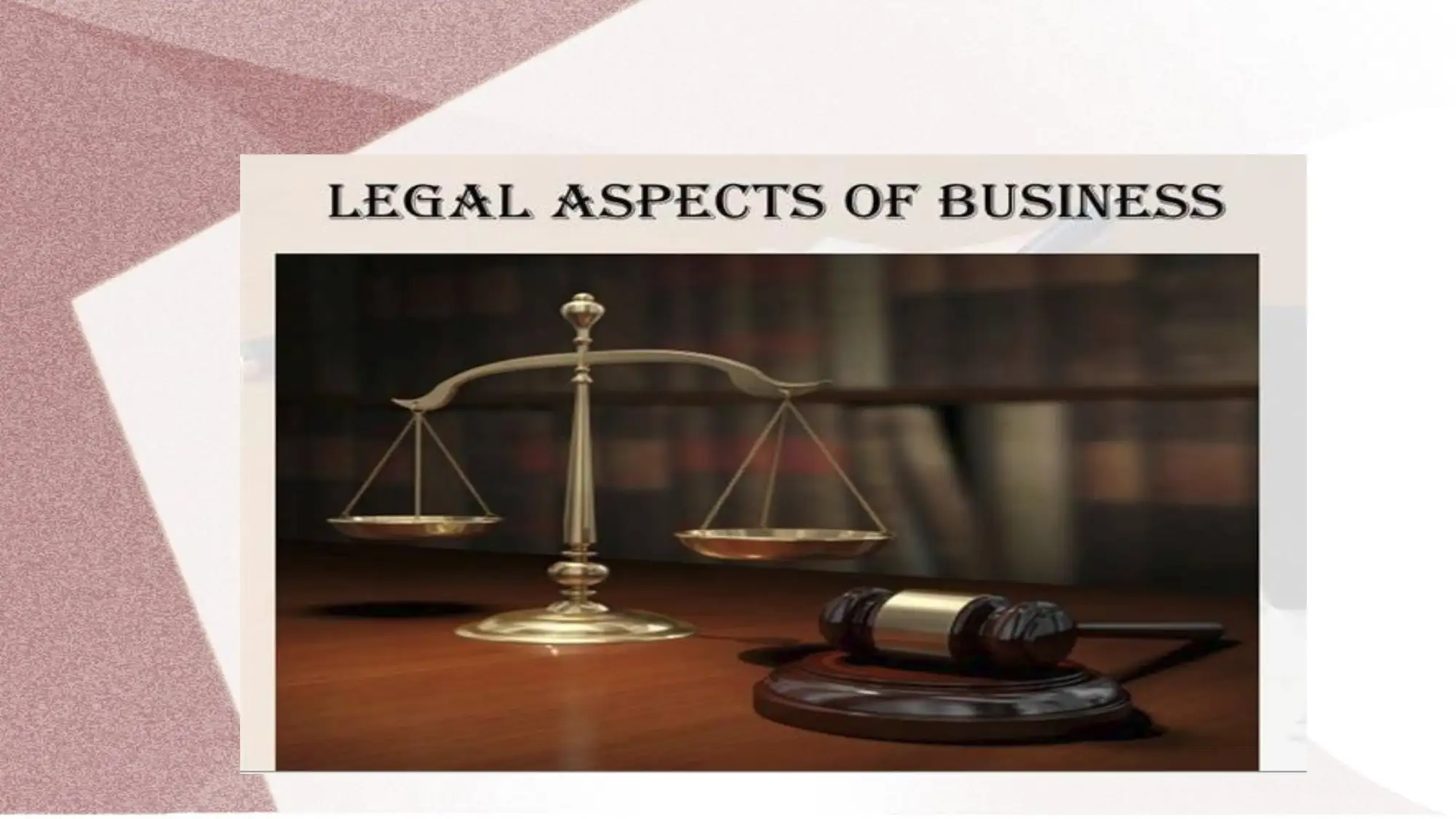
Paraphrase This Document
Need a fresh take? Get an instant paraphrase of this document with our AI Paraphraser
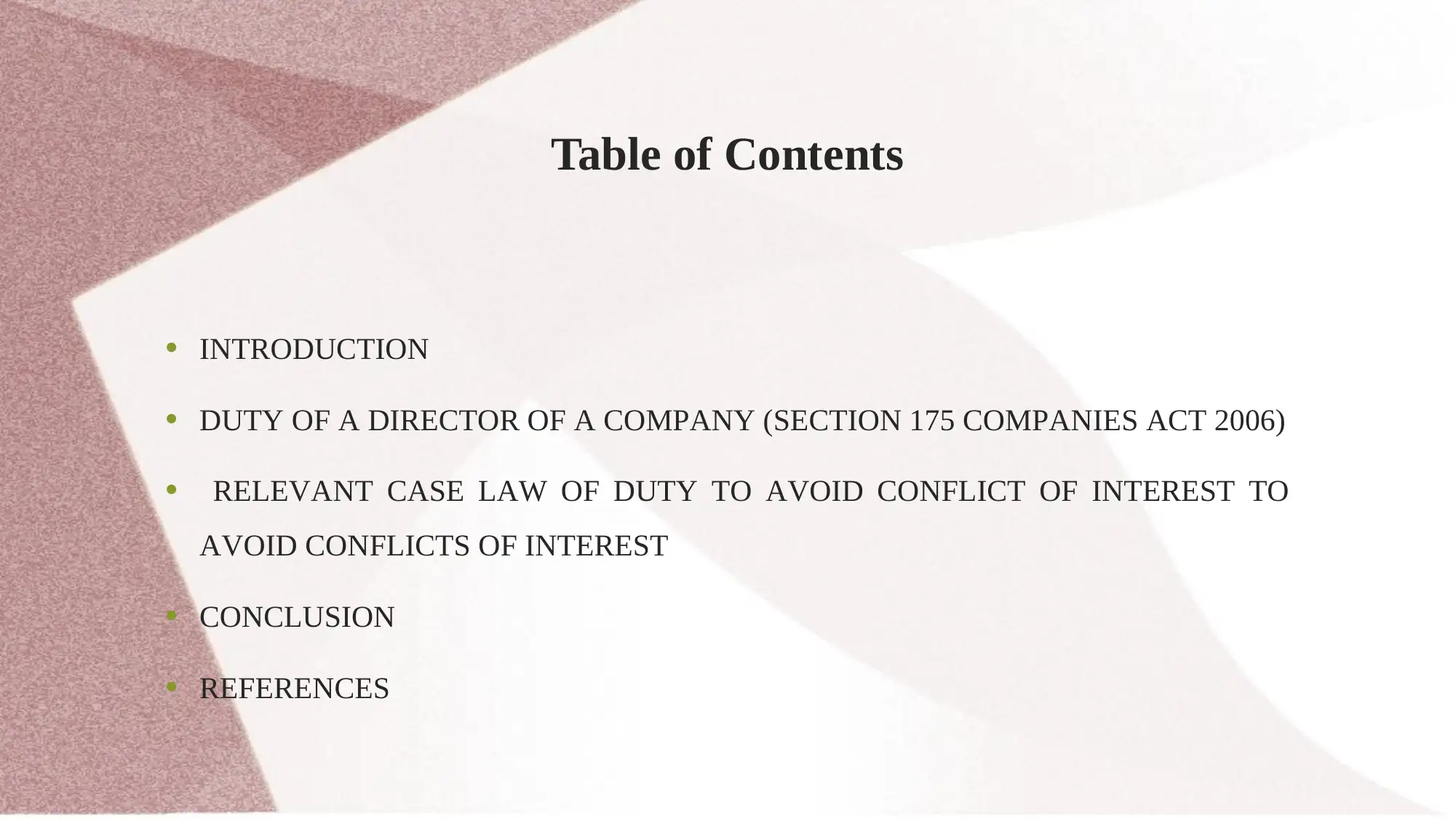
Table of Contents
• INTRODUCTION
• DUTY OF A DIRECTOR OF A COMPANY (SECTION 175 COMPANIES ACT 2006)
• RELEVANT CASE LAW OF DUTY TO AVOID CONFLICT OF INTEREST TO
AVOID CONFLICTS OF INTEREST
• CONCLUSION
• REFERENCES
• INTRODUCTION
• DUTY OF A DIRECTOR OF A COMPANY (SECTION 175 COMPANIES ACT 2006)
• RELEVANT CASE LAW OF DUTY TO AVOID CONFLICT OF INTEREST TO
AVOID CONFLICTS OF INTEREST
• CONCLUSION
• REFERENCES
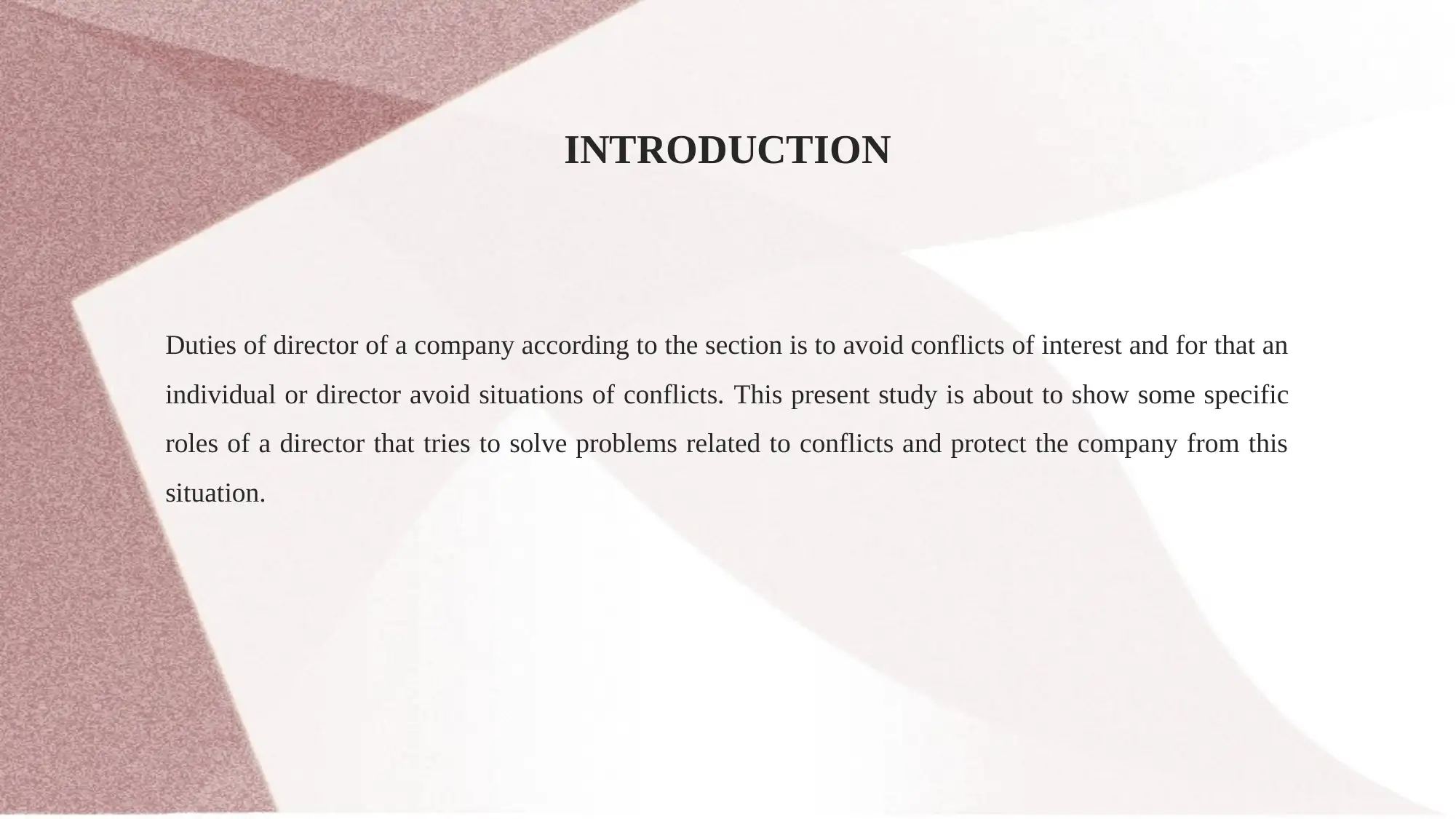
INTRODUCTION
Duties of director of a company according to the section is to avoid conflicts of interest and for that an
individual or director avoid situations of conflicts. This present study is about to show some specific
roles of a director that tries to solve problems related to conflicts and protect the company from this
situation.
Duties of director of a company according to the section is to avoid conflicts of interest and for that an
individual or director avoid situations of conflicts. This present study is about to show some specific
roles of a director that tries to solve problems related to conflicts and protect the company from this
situation.
⊘ This is a preview!⊘
Do you want full access?
Subscribe today to unlock all pages.

Trusted by 1+ million students worldwide
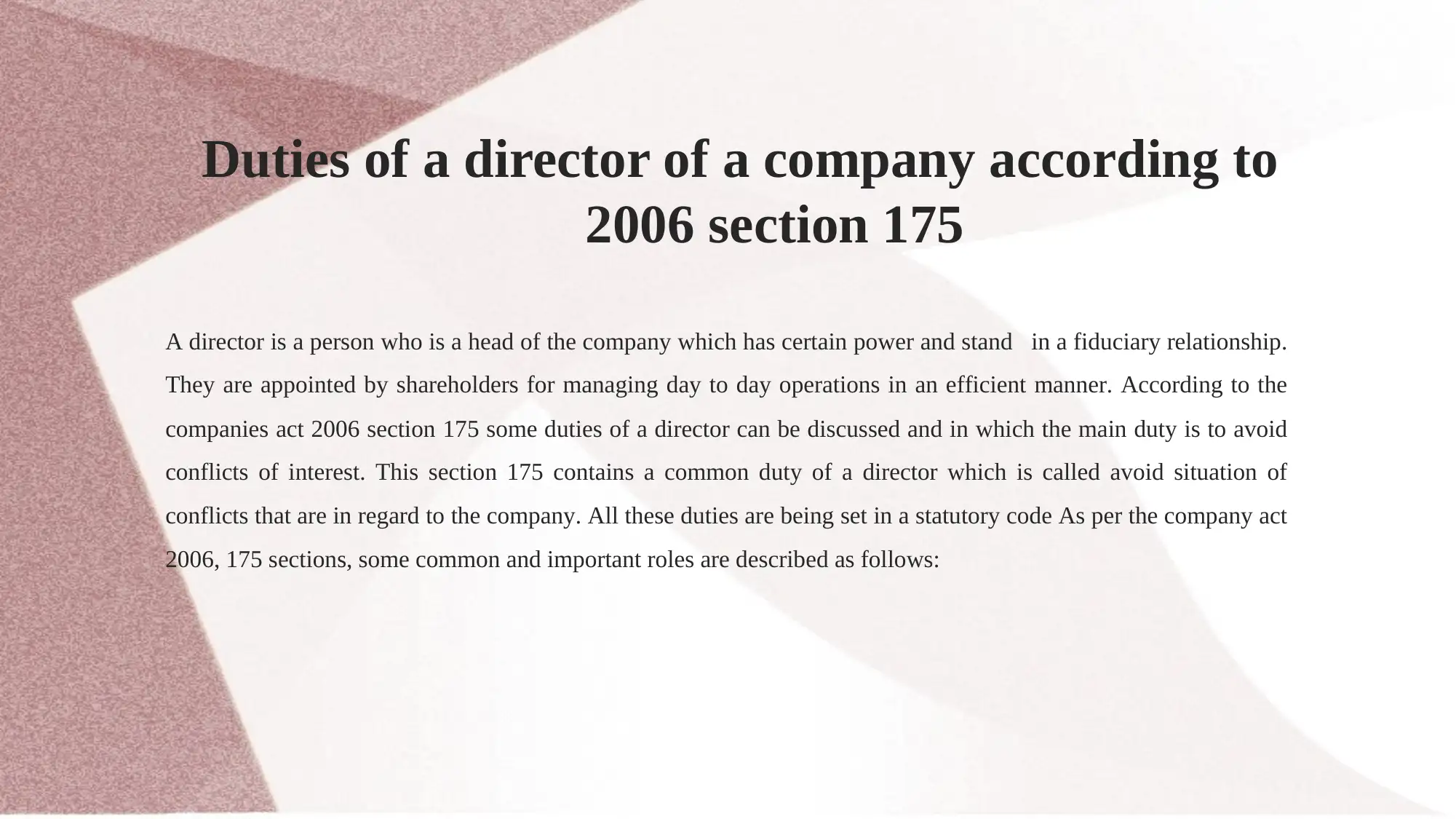
Duties of a director of a company according to
2006 section 175
A director is a person who is a head of the company which has certain power and stand in a fiduciary relationship.
They are appointed by shareholders for managing day to day operations in an efficient manner. According to the
companies act 2006 section 175 some duties of a director can be discussed and in which the main duty is to avoid
conflicts of interest. This section 175 contains a common duty of a director which is called avoid situation of
conflicts that are in regard to the company. All these duties are being set in a statutory code As per the company act
2006, 175 sections, some common and important roles are described as follows:
2006 section 175
A director is a person who is a head of the company which has certain power and stand in a fiduciary relationship.
They are appointed by shareholders for managing day to day operations in an efficient manner. According to the
companies act 2006 section 175 some duties of a director can be discussed and in which the main duty is to avoid
conflicts of interest. This section 175 contains a common duty of a director which is called avoid situation of
conflicts that are in regard to the company. All these duties are being set in a statutory code As per the company act
2006, 175 sections, some common and important roles are described as follows:
Paraphrase This Document
Need a fresh take? Get an instant paraphrase of this document with our AI Paraphraser
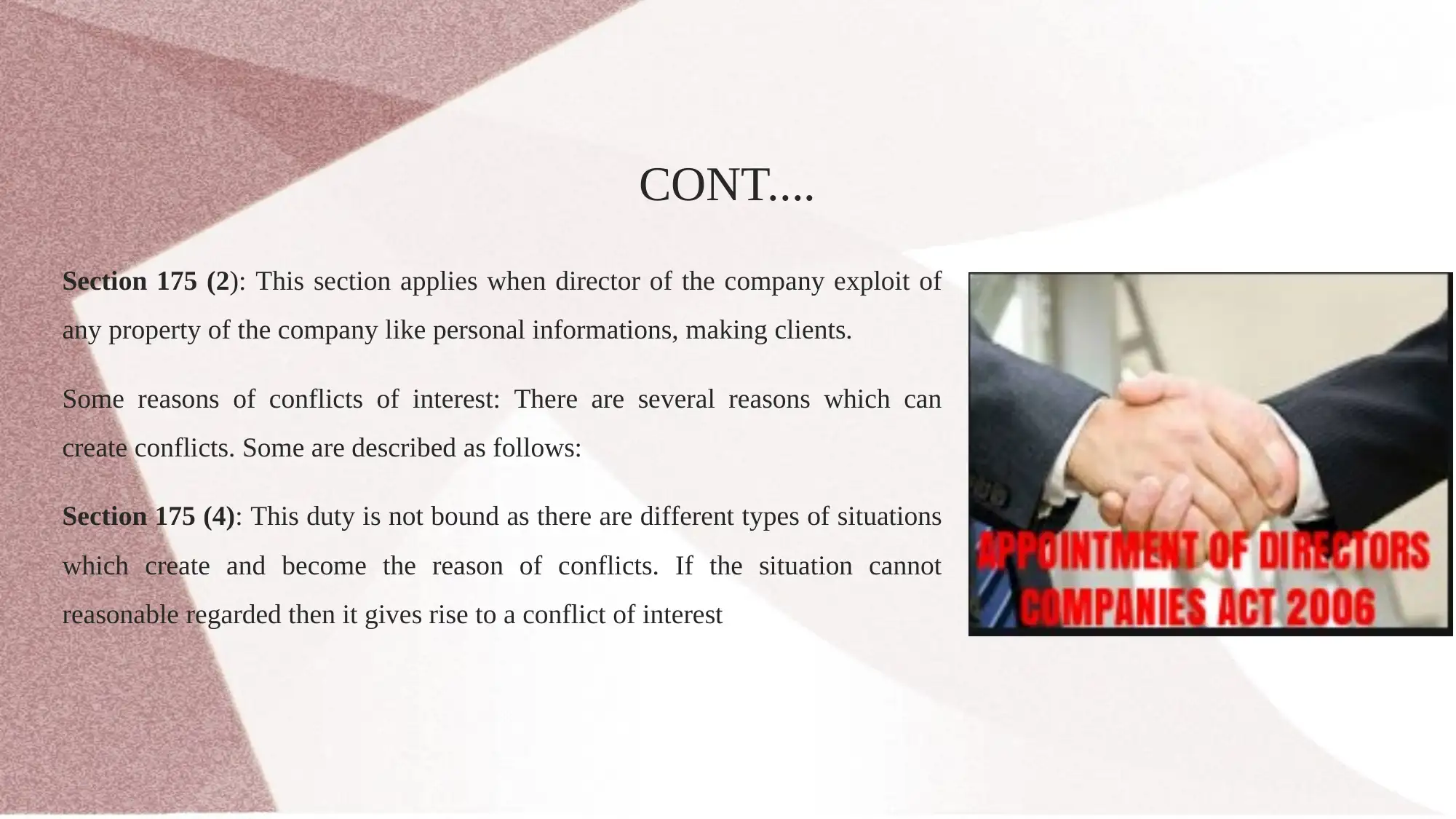
CONT....
Section 175 (2): This section applies when director of the company exploit of
any property of the company like personal informations, making clients.
Some reasons of conflicts of interest: There are several reasons which can
create conflicts. Some are described as follows:
Section 175 (4): This duty is not bound as there are different types of situations
which create and become the reason of conflicts. If the situation cannot
reasonable regarded then it gives rise to a conflict of interest
Section 175 (2): This section applies when director of the company exploit of
any property of the company like personal informations, making clients.
Some reasons of conflicts of interest: There are several reasons which can
create conflicts. Some are described as follows:
Section 175 (4): This duty is not bound as there are different types of situations
which create and become the reason of conflicts. If the situation cannot
reasonable regarded then it gives rise to a conflict of interest
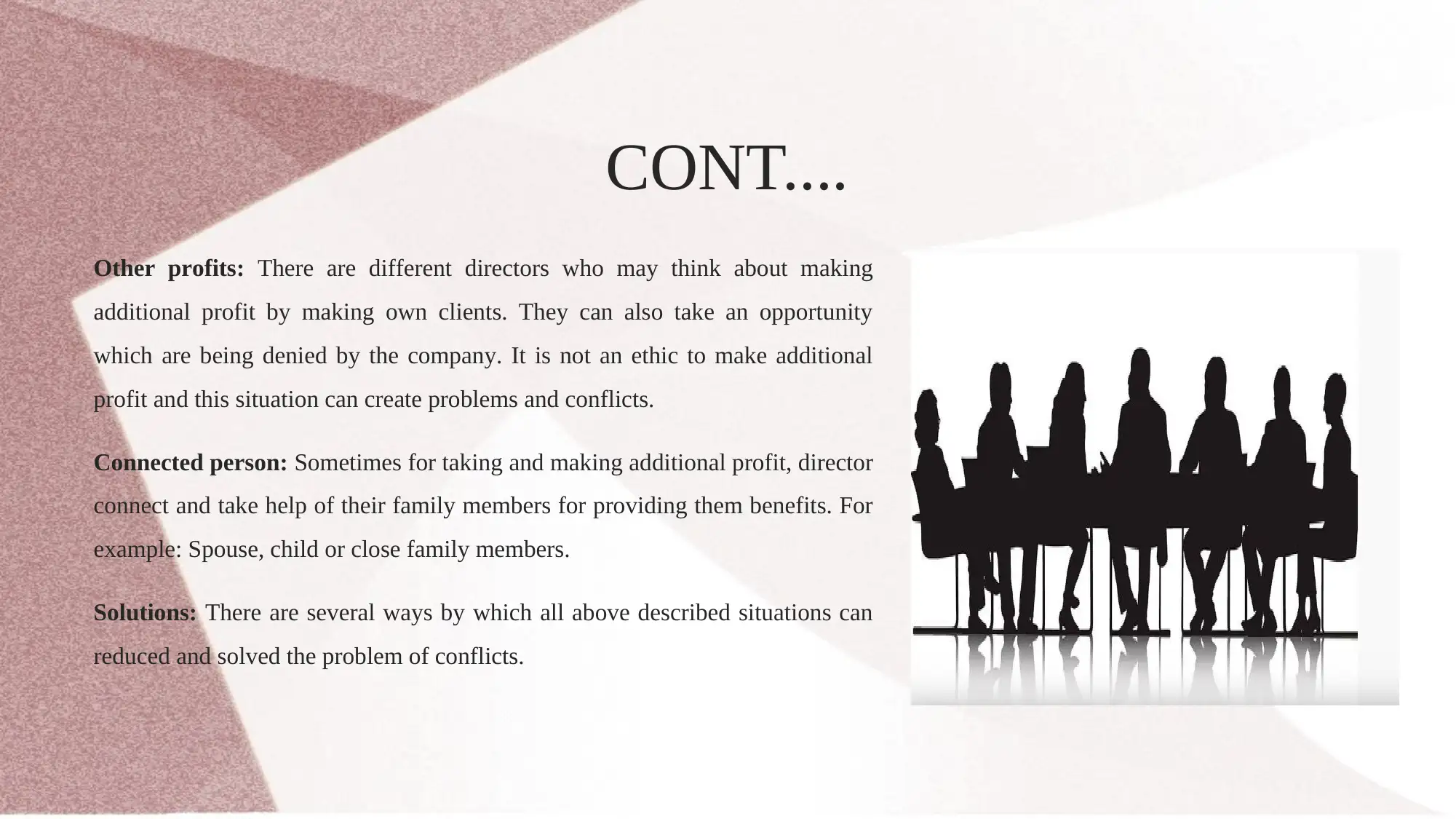
CONT....
Other profits: There are different directors who may think about making
additional profit by making own clients. They can also take an opportunity
which are being denied by the company. It is not an ethic to make additional
profit and this situation can create problems and conflicts.
Connected person: Sometimes for taking and making additional profit, director
connect and take help of their family members for providing them benefits. For
example: Spouse, child or close family members.
Solutions: There are several ways by which all above described situations can
reduced and solved the problem of conflicts.
Other profits: There are different directors who may think about making
additional profit by making own clients. They can also take an opportunity
which are being denied by the company. It is not an ethic to make additional
profit and this situation can create problems and conflicts.
Connected person: Sometimes for taking and making additional profit, director
connect and take help of their family members for providing them benefits. For
example: Spouse, child or close family members.
Solutions: There are several ways by which all above described situations can
reduced and solved the problem of conflicts.
⊘ This is a preview!⊘
Do you want full access?
Subscribe today to unlock all pages.

Trusted by 1+ million students worldwide
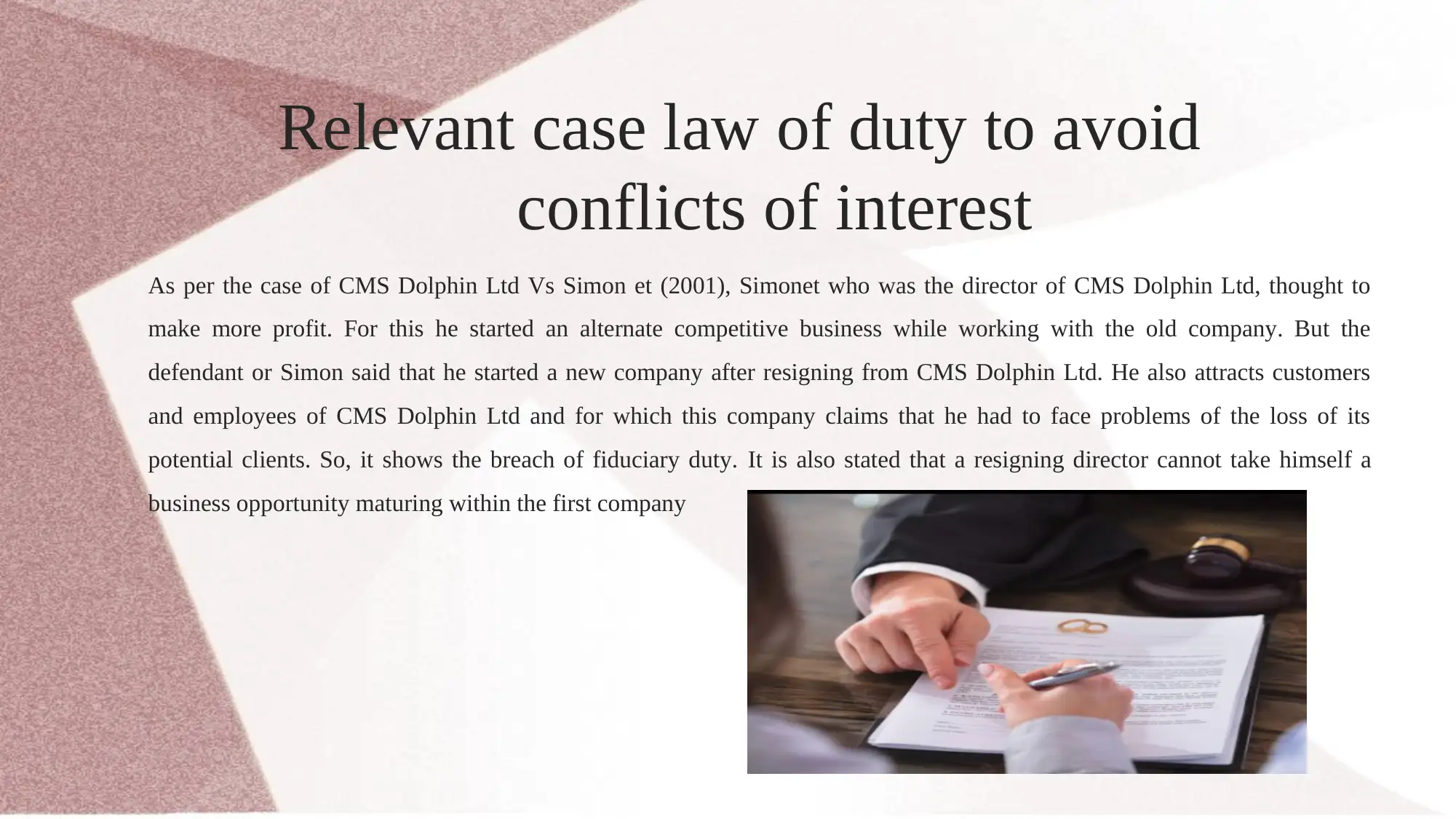
Relevant case law of duty to avoid
conflicts of interest
As per the case of CMS Dolphin Ltd Vs Simon et (2001), Simonet who was the director of CMS Dolphin Ltd, thought to
make more profit. For this he started an alternate competitive business while working with the old company. But the
defendant or Simon said that he started a new company after resigning from CMS Dolphin Ltd. He also attracts customers
and employees of CMS Dolphin Ltd and for which this company claims that he had to face problems of the loss of its
potential clients. So, it shows the breach of fiduciary duty. It is also stated that a resigning director cannot take himself a
business opportunity maturing within the first company
conflicts of interest
As per the case of CMS Dolphin Ltd Vs Simon et (2001), Simonet who was the director of CMS Dolphin Ltd, thought to
make more profit. For this he started an alternate competitive business while working with the old company. But the
defendant or Simon said that he started a new company after resigning from CMS Dolphin Ltd. He also attracts customers
and employees of CMS Dolphin Ltd and for which this company claims that he had to face problems of the loss of its
potential clients. So, it shows the breach of fiduciary duty. It is also stated that a resigning director cannot take himself a
business opportunity maturing within the first company
Paraphrase This Document
Need a fresh take? Get an instant paraphrase of this document with our AI Paraphraser
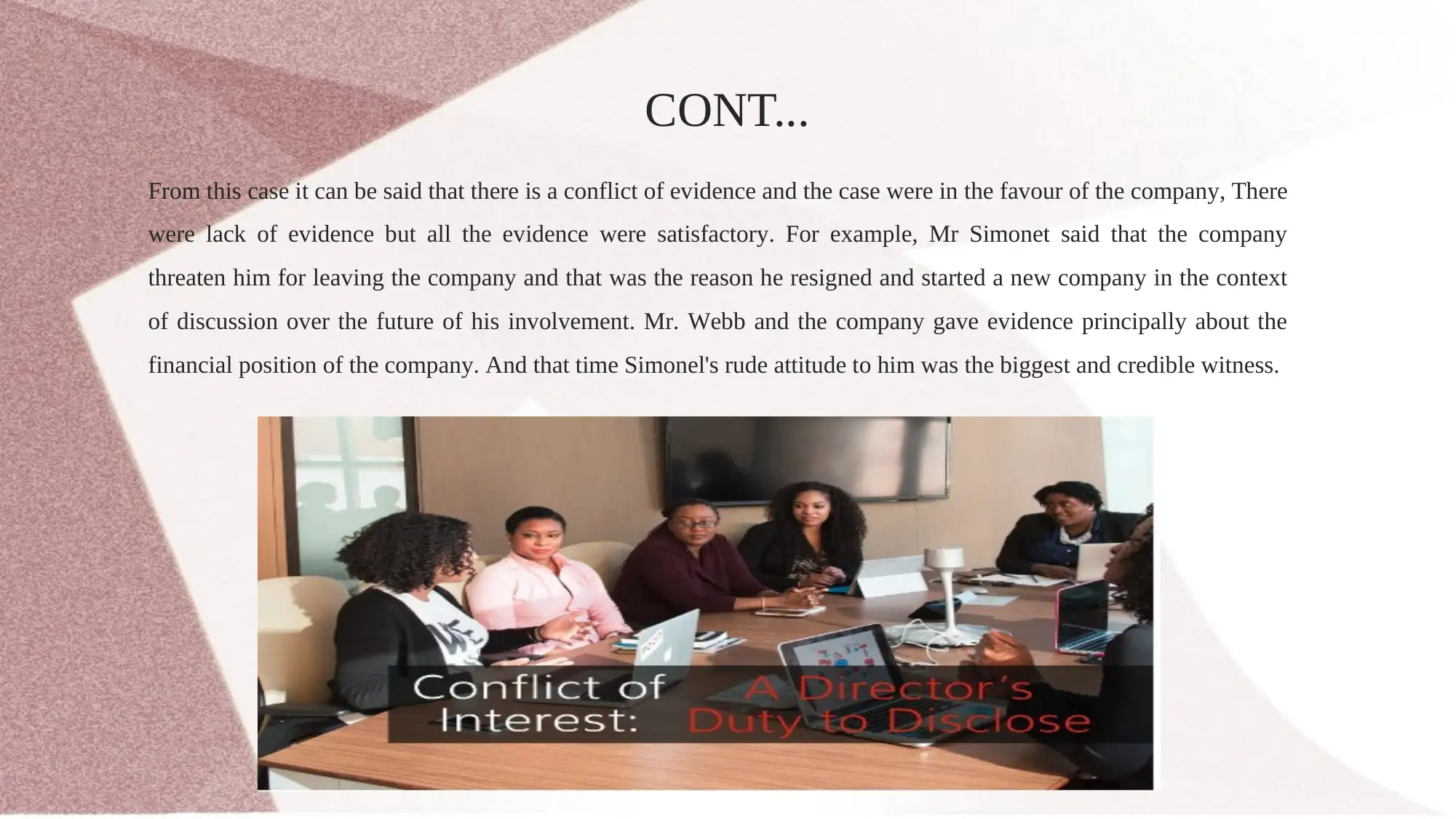
CONT...
From this case it can be said that there is a conflict of evidence and the case were in the favour of the company, There
were lack of evidence but all the evidence were satisfactory. For example, Mr Simonet said that the company
threaten him for leaving the company and that was the reason he resigned and started a new company in the context
of discussion over the future of his involvement. Mr. Webb and the company gave evidence principally about the
financial position of the company. And that time Simonel's rude attitude to him was the biggest and credible witness.
From this case it can be said that there is a conflict of evidence and the case were in the favour of the company, There
were lack of evidence but all the evidence were satisfactory. For example, Mr Simonet said that the company
threaten him for leaving the company and that was the reason he resigned and started a new company in the context
of discussion over the future of his involvement. Mr. Webb and the company gave evidence principally about the
financial position of the company. And that time Simonel's rude attitude to him was the biggest and credible witness.
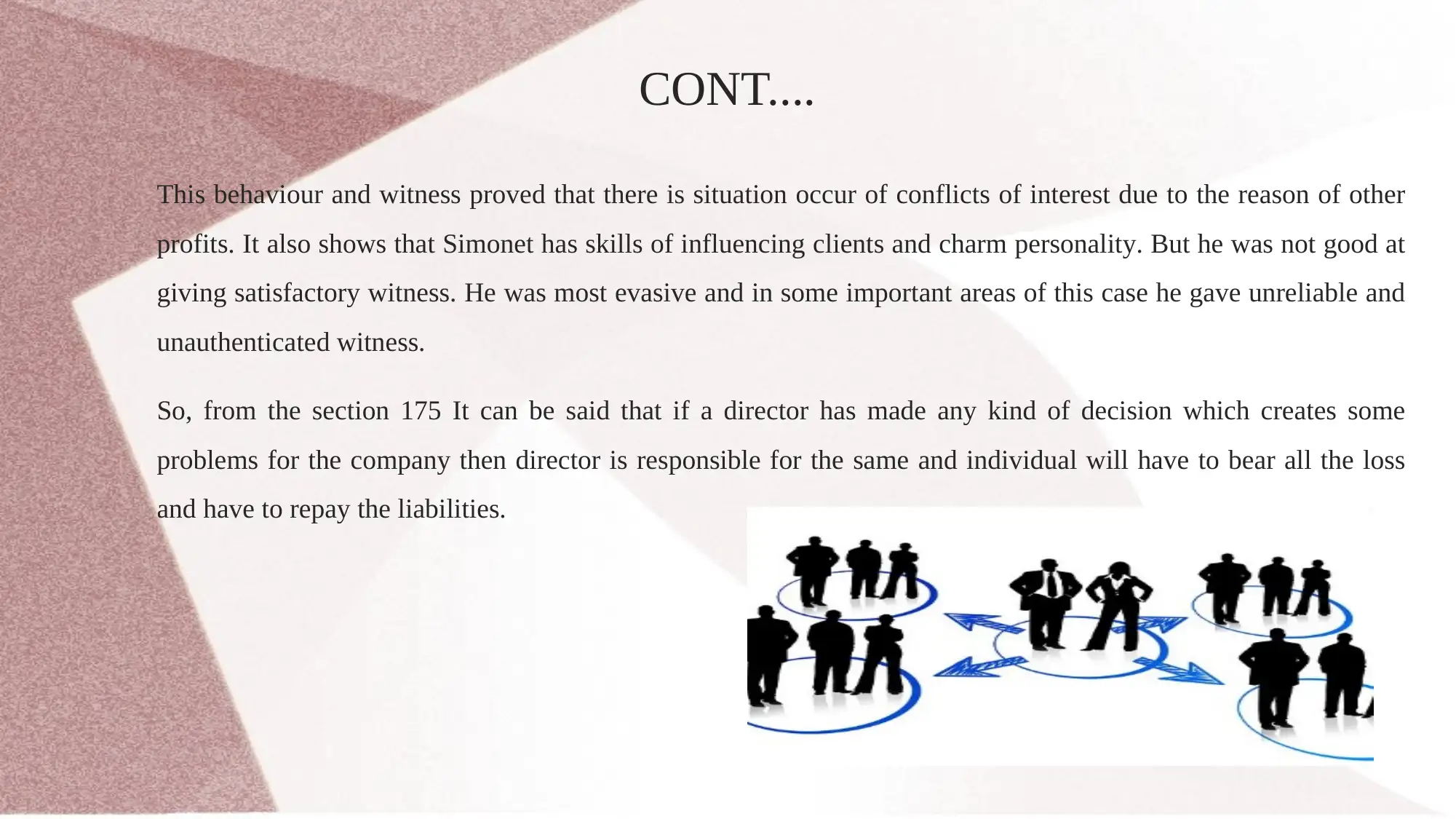
CONT....
This behaviour and witness proved that there is situation occur of conflicts of interest due to the reason of other
profits. It also shows that Simonet has skills of influencing clients and charm personality. But he was not good at
giving satisfactory witness. He was most evasive and in some important areas of this case he gave unreliable and
unauthenticated witness.
So, from the section 175 It can be said that if a director has made any kind of decision which creates some
problems for the company then director is responsible for the same and individual will have to bear all the loss
and have to repay the liabilities.
This behaviour and witness proved that there is situation occur of conflicts of interest due to the reason of other
profits. It also shows that Simonet has skills of influencing clients and charm personality. But he was not good at
giving satisfactory witness. He was most evasive and in some important areas of this case he gave unreliable and
unauthenticated witness.
So, from the section 175 It can be said that if a director has made any kind of decision which creates some
problems for the company then director is responsible for the same and individual will have to bear all the loss
and have to repay the liabilities.
⊘ This is a preview!⊘
Do you want full access?
Subscribe today to unlock all pages.

Trusted by 1+ million students worldwide

CONCLUSION
From the above study it has been summarized that director of an organization played a vital role as
they have to play several roles for preventing company from conflicts and lawsuits. Some other
duties and responsibilities of a director of a company also has been discussed by applying relevant
law.
From the above study it has been summarized that director of an organization played a vital role as
they have to play several roles for preventing company from conflicts and lawsuits. Some other
duties and responsibilities of a director of a company also has been discussed by applying relevant
law.
Paraphrase This Document
Need a fresh take? Get an instant paraphrase of this document with our AI Paraphraser
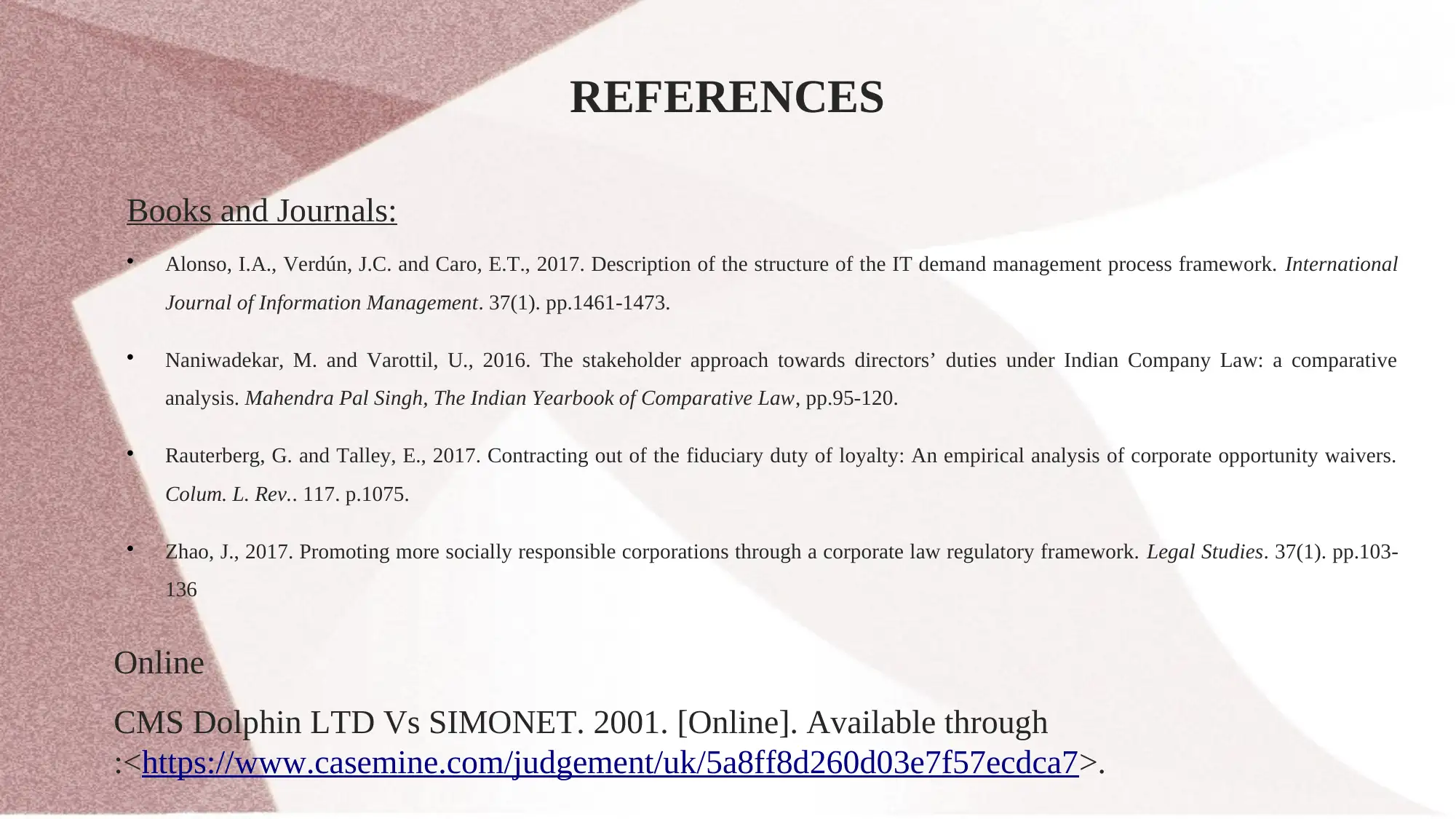
REFERENCES
Books and Journals:
Alonso, I.A., Verdún, J.C. and Caro, E.T., 2017. Description of the structure of the IT demand management process framework. International
Journal of Information Management. 37(1). pp.1461-1473.
Naniwadekar, M. and Varottil, U., 2016. The stakeholder approach towards directors’ duties under Indian Company Law: a comparative
analysis. Mahendra Pal Singh, The Indian Yearbook of Comparative Law, pp.95-120.
Rauterberg, G. and Talley, E., 2017. Contracting out of the fiduciary duty of loyalty: An empirical analysis of corporate opportunity waivers.
Colum. L. Rev.. 117. p.1075.
Zhao, J., 2017. Promoting more socially responsible corporations through a corporate law regulatory framework. Legal Studies. 37(1). pp.103-
136
Online
CMS Dolphin LTD Vs SIMONET. 2001. [Online]. Available through
:<https://www.casemine.com/judgement/uk/5a8ff8d260d03e7f57ecdca7>.
Books and Journals:
Alonso, I.A., Verdún, J.C. and Caro, E.T., 2017. Description of the structure of the IT demand management process framework. International
Journal of Information Management. 37(1). pp.1461-1473.
Naniwadekar, M. and Varottil, U., 2016. The stakeholder approach towards directors’ duties under Indian Company Law: a comparative
analysis. Mahendra Pal Singh, The Indian Yearbook of Comparative Law, pp.95-120.
Rauterberg, G. and Talley, E., 2017. Contracting out of the fiduciary duty of loyalty: An empirical analysis of corporate opportunity waivers.
Colum. L. Rev.. 117. p.1075.
Zhao, J., 2017. Promoting more socially responsible corporations through a corporate law regulatory framework. Legal Studies. 37(1). pp.103-
136
Online
CMS Dolphin LTD Vs SIMONET. 2001. [Online]. Available through
:<https://www.casemine.com/judgement/uk/5a8ff8d260d03e7f57ecdca7>.

⊘ This is a preview!⊘
Do you want full access?
Subscribe today to unlock all pages.

Trusted by 1+ million students worldwide
1 out of 12
Related Documents
Your All-in-One AI-Powered Toolkit for Academic Success.
+13062052269
info@desklib.com
Available 24*7 on WhatsApp / Email
![[object Object]](/_next/static/media/star-bottom.7253800d.svg)
Unlock your academic potential
© 2024 | Zucol Services PVT LTD | All rights reserved.





